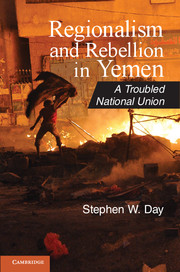Book contents
- Frontmatter
- Contents
- Tables
- Maps and Photos
- Preface
- Acknowledgments
- Abbreviations
- Chronology of Modern Yemeni History
- Glossary of Names of Key Political Figures
- Introduction
- 1 Understanding the Regional Divisions of Yemen
- 2 Two Revolutions, Two Republics
- 3 Salih Family Rules and the Sanhan Tribe
- 4 Unity in Name Only
- 5 The Spoils of Civil War
- 6 A Regime in Control?
- 7 Political Eruptions after 9/11
- 8 The Return of Yemeni Regionalism
- 9 Yemen’s Political Meltdown
- Conclusion
- Appendix
- Bibliography
- Index
3 - Salih Family Rules and the Sanhan Tribe
Published online by Cambridge University Press: 05 July 2012
- Frontmatter
- Contents
- Tables
- Maps and Photos
- Preface
- Acknowledgments
- Abbreviations
- Chronology of Modern Yemeni History
- Glossary of Names of Key Political Figures
- Introduction
- 1 Understanding the Regional Divisions of Yemen
- 2 Two Revolutions, Two Republics
- 3 Salih Family Rules and the Sanhan Tribe
- 4 Unity in Name Only
- 5 The Spoils of Civil War
- 6 A Regime in Control?
- 7 Political Eruptions after 9/11
- 8 The Return of Yemeni Regionalism
- 9 Yemen’s Political Meltdown
- Conclusion
- Appendix
- Bibliography
- Index
Summary
In the highland mountains encircling Sanaa, the tribesmen of Hashid and Bakil set themselves above other tribal and nontribal people of the country. They are very proud of a local culture that is deeply conservative, paternalist, and militarized. This is the part of Yemen where it is frequently said that guns outnumber people. On average, each adult male possesses three or four firearms: common handguns, rifles and machine guns, and even heavier fire power like rocket-propelled grenade launchers (RPGs) and in rare cases, heavy artillery. In the early 2000s, Sanaa’s capital zone began to enforce a gun ban. This required all entrants to deposit their weapons at special registration centers, where they could be retrieved upon exiting the city. Outside the capital, most men remained well armed. It is common to see local tribesmen carrying AK-47s, while wearing the traditional curved dagger known as jambiyya. Guns and jambiyya are found in other regions of Yemen, but in the northwest highland mountains they are omnipresent.
The custom of carrying guns feeds a sense of superiority among highland tribesmen, especially the tribal shaykhs of Hashid and Bakil who feel they are more powerful and capable of ruling the country than Yemenis living at lower elevations. People in lower lying regions acknowledge this sense of superiority among highland tribes, yet it is greatly resented. The word for the highlands, al-jabali, is closely associated with power and dominance in Yemen. Highland culture is best described by a local phrase used to express a type of machismo among men. Ahmar al-‘ayn, meaning “red of the eye,” describes a man of great daring and boldness, who surpasses his rivals in courage. It may also apply to a man who goes beyond bravery to recklessly aggressive behavior. As leader of Yemen, and a member of Hashid, President Ali Abdallah Salih long fashioned himself as the quintessential red-eye man.
- Type
- Chapter
- Information
- Regionalism and Rebellion in YemenA Troubled National Union, pp. 86 - 106Publisher: Cambridge University PressPrint publication year: 2012



